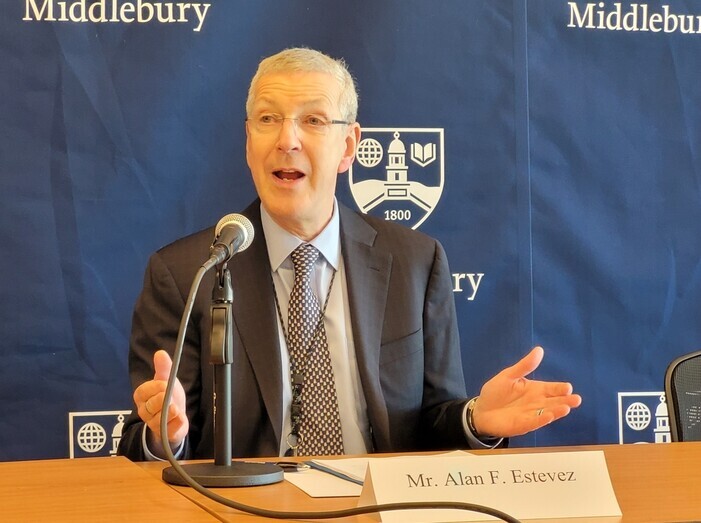hankyoreh
Links to other country sites 다른 나라 사이트 링크
US hints at enlisting S. Korea for export control regime to keep advanced tech out of China’s hands

Senior US government officials announced that they are holding discussions with South Korea and other allies on a new multilateral export control regime in high-tech areas such as semiconductors, supercomputers, quantum computing and artificial intelligence.
The efforts are being read as a move to enlist allies’ support in preventing China from acquiring advanced technology.
In a keynote speech at a South Korea-US economic security conference held in Washington on Tuesday, Alan Estevez, the US undersecretary of commerce for industry and security, stressed the need for a new export control regime, explaining that existing multilateral export control regimes such as the Wassenaar Arrangement are failing to keep pace with technological changes.
Launched in 1996, the Wassenaar Arrangement is an export control regime for strategic items that currently has 42 states as members. But observers have remarked that since Russia is one of those members, the regime is not available to be used as a means of sanctioning it.
Emphasizing that the US “can’t do this alone,” Estevez said discussions were underway on a new regime to protect the US and its allies from adversaries. He cited semiconductors as an example to explain how an export control regime could be created by a small number of countries with technology and production capabilities in a particular area.
When asked whether South Korea was being discussed as a potential participant in the new regime, Estevez affirmed that it was such a country.
“I don’t think we could do it without Korea being involved,” he said.
When asked whether the new export control regime would exclude China, Estevez insisted he was not interested in starting a fight.
But in underscoring the need for export controls in areas such as advanced semiconductors and quantum computing, he suggested that containing China would be a focus, explaining, “What we’re saying is China cannot modernize its military technology. Full stop.”
Appearing as a panelist was Gonzalo Suarez, the US deputy assistant secretary of state for international security and nonproliferation, who stressed the importance of South Korea’s cooperation on export controls.
“It is important for countries in the region, like Korea, to ensure that Korean-origin sensitive items do not end up in Chinese military modernization programs,” he said.
Analysts read the US’ remarks about discussing a new multilateral export control regime as signaling its intent to enlist South Korea and other allies to ramp up the effectiveness of its controls against China, having determined that its own independent export controls lack effectiveness and have only hurt US businesses.
If the US is working to establish and employ such a framework, this appears likely to lead to greater pressure on South Korea’s government and businesses with regard to advanced technologies.
At a summit in San Francisco early last month, US President Joe Biden and Chinese President Xi Jinping reached an agreement to avoid escalation in their conflicts — but the US continues to show its intent to contain China.
On Wednesday, a US House of Representatives select committee on China submitted a report with around 150 recommendations, which included stripping China of its “most favored nation” status in trade and beefing up controls of advanced technology exports to China.
The select committee also argued for major adjustments to the economic relationship between the US and China, including a recommendation to consider halting business operations in the US by TikTok, a video-sharing platform under Chinese ownership.
By Lee Bon-young, Washington correspondent
Please direct questions or comments to [english@hani.co.kr]

Editorial・opinion
![[Guest essay] Preventing Korean Peninsula from becoming front line of new cold war [Guest essay] Preventing Korean Peninsula from becoming front line of new cold war](https://flexible.img.hani.co.kr/flexible/normal/500/300/imgdb/original/2024/0507/7217150679227807.jpg) [Guest essay] Preventing Korean Peninsula from becoming front line of new cold war
[Guest essay] Preventing Korean Peninsula from becoming front line of new cold war![[Column] The state is back — but is it in business? [Column] The state is back — but is it in business?](https://flexible.img.hani.co.kr/flexible/normal/500/300/imgdb/original/2024/0506/8217149564092725.jpg) [Column] The state is back — but is it in business?
[Column] The state is back — but is it in business?- [Column] Life on our Trisolaris
- [Editorial] Penalties for airing allegations against Korea’s first lady endanger free press
- [Editorial] Yoon must halt procurement of SM-3 interceptor missiles
- [Guest essay] Maybe Korea’s rapid population decline is an opportunity, not a crisis
- [Column] Can Yoon steer diplomacy with Russia, China back on track?
- [Column] Season 2 of special prosecutor probe may be coming to Korea soon
- [Column] Park Geun-hye déjà vu in Yoon Suk-yeol
- [Editorial] New weight of N. Korea’s nuclear threats makes dialogue all the more urgent
Most viewed articles
- 1Behind-the-times gender change regulations leave trans Koreans in the lurch
- 2Yoon’s revival of civil affairs senior secretary criticized as shield against judicial scrutiny
- 3Unexpected rate of AI development requires timely discussion of side effects
- 4Family that exposed military cover-up of loved one’s death reflect on Marine’s death
- 5Marines who survived flood that killed colleague urge president to OK special counsel probe
- 6Japan says its directives were aimed at increasing Line’s security, not pushing Naver buyout
- 7A breath of fresh air: Innovative architecture in the time of COVID-19
- 8‘Weddingflation’ breaks the bank for Korean couples-to-be
- 9South Korean ambassador attends Putin’s inauguration as US and others boycott
- 10Mother of Sewol victim travels 3,100km in 21 days to raise awareness about investigation into ferry